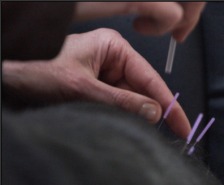Is Acupuncture for Dogs Safe and Effective?

Overview
Acupuncture is gaining popularity in many countries as an alternative or complementary non-medicated treatment for dogs.
You may wonder if acupuncture is safe for dogs and whether it can help dogs with different health issues, such as arthritis, hip dysplasia, or even cancer.
More importantly, are there any undesirable side effects?
With that in mind, I have put together this article that focuses on some of the questions that many dog parents have regarding acupuncture for dogs:
What is Acupuncture?
Acupuncture is a health treatment developed about 5,000 years ago by the Chinese. By inserting tiny metal needles into specific points (called "acupoints") in the body, these doctors in the early days discovered that they could cause physiological changes, control and suppress pain, and stimulate organs or body parts.
Acupoints are run along pathways called "meridians", which connect the entire body and through which the "Qi" (pronounced as "chee"), or life force energy, circulates.
Although the meridians run deep in the body, they surface at certain points on the skin. These acupoints are where the meridians can be accessed in order to creat change in the associated body organs or structures.
According to Chinese acupuncture literature, there are 12 major meridians and 365 acupoints in the body.
In Eastern medicine, the thinking is that disorders or diseases occur when the "Qi" is out of balance.
Acupuncture is one way to stimulate the body to release its own pain relieving and anti-inflammatory substances, to rebalance the body, and to create harmony of Qi.
What Kind of Canine Illnesses Can Be Treated by Acupuncture?
Acupuncture is NOT appropriate for major acute diseases or emergencies (e.g. broken bones, overwhelming viral or bacterial infections).
On the other hand, it is a great alternative or complementary treatment for chronic diseases.
Acupuncture can help dogs with:
- Pain: e.g. caused by arthritis, injuries, cancer, etc.
- Musculoskeletal Problems: osteoarthritis, hip dysplasia, chronic degenerative joint disease, intervertebral disc disease, tendonitis, sprains and muscle spasms.
- Neurological Problems: epilepsy, stroke, deafness, coma, paralysis from disc disease.
- Urinary Disorders: incontinence, cystitis, urine retention.
- Gastrointestinal Problems: colitis, chronic idiopathic diarrhea or vomiting, gastroenteritis, rectal prolapse.
- Respiratory Disorders: sinusitis, rhinitis, asthma, chronic coughing, pneumonia.
- Systemic Inflammatory Conditions: chronic skin inflammation, allergies, lick granulomas.
- Cancer: More and more veterinarians are now incorporating acupuncture as a part of canine cancer treatment protocol. Acupuncture is used either to lessen the side effects of chemotherapy, boost the immune system and improve quality of life, or to actually inhibit the growth of the cancerous tumor itself.
Want to know more about some of the above disorders? Visit our page on Canine Health Problems.
How Long Is a Session & How Much?
 Each treatment is individualized to each dog patient. The acupoints selected, the number of needles, and the length of treatment all depend on the type and severity of the dog's condition.
Each treatment is individualized to each dog patient. The acupoints selected, the number of needles, and the length of treatment all depend on the type and severity of the dog's condition.
Acupuncture for dogs is usually performed with small, tiny metal needles.
Most dogs do not mind (and do not even feel) the needles being inserted. Most of them seem to feel relaxed and comfortable. Some go right to sleep during treatment!
Generally speaking, one treatment lasts for 10 to 20 minutes. Most cases are seen once or twice a week at first, after which the number of treatments can be reduced depending on progress.
The costs also vary depending on the clinic and your dog's condition. Broadly speaking, it could range from $60 to over $100 per session.
Variations of Acupuncture Treatment
Besides metal needles, there are some variations that are proving quite successful as well, including:
- Aquapuncture: This involves injecting the acupoints with a solution of vitamin B12 and saline. The solution puts pressure on and thus stimulates the point for a longer period of time and is a good technique to use if the dog does not want to stay still for 20 minutes.
- Electroacupuncture: This involves connecting electrodes from a small battery-operated unit to the needles in different acupoints.
A very gentle current is passed through the points and down the meridians. This type of treatment encourages the flow of energy, blood and lymph along the meridians and speeds up healing.
- Laser Acupuncture: This involves the use of lasers rather than needles on acupoints and can be beneficial for dogs who absolutely don't want anything to do with needles.
- Moxibustion: This is a very old Chinese treatment modality that involves heating the acupuncture needles with a dried herbal incense.
It stimulates blood flow and can be an excellent treatment for older arthritic dogs with sore and stiff joints and tight muscles.
- Acupressure: Instead of using needles, acupressure uses fingers to press on specific acupoints. Japanese "shiatsu" is a kind of acupressure.
This type of treatment is gaining popularity because, while acupuncture is invasive, acupressure is not and can therefore be done by even pet owners (with training and guidance from a trained practitioner of course).
Is Acupuncture Safe for Dogs?
Acupuncture for dogs is very safe and causes no undesirable side effects IF the acupuncturist has received formal training, and most importantly, is licensed.
The effectiveness of canine acupuncture depends on a few factors, such as:
- The acupuncturist's experience and technique.
- The condition of the dog, e.g. how long the dog has been sick, and how serious the health problem being treated is.
- The number, length and consistency of treatments.
Occasionally a positive response may be seen after only one treatment, but more often than not, 4 to 6 treatments are needed. Sometimes it can take up to eight treatments before results can be seen.
According to Dr. Karen Becker (a holistic vet who also uses pet acupuncture in her practice), about 25% of patients have a very positive response to acupuncture, showing major improvement to the point of fully recovering from the condition. Another 50% of patients experience dramatic improvement but with some symptoms remaining; while 25% have no response at all.
In addition, acupuncture for dogs does not cause any undesirable adverse side effects to the dog patients.
So, for example, if your dog has allergies but you do not want to load up his body with prescription drugs, you may want to explore using acupuncture as an alternative treatment option.
Or you may want to use acupuncture as a complimentary treatment option in order to lower the dosage of the prescription drugs. Acupuncture does not interact with conventional medications, so it can be safely used with conventional treatment.
Where Can I Find Acupuncture Veterinary Professionals?
If you are interested in acupuncture for your dog, ask your holistic vet, or access the website of International Veterinary Acupuncture Society.





